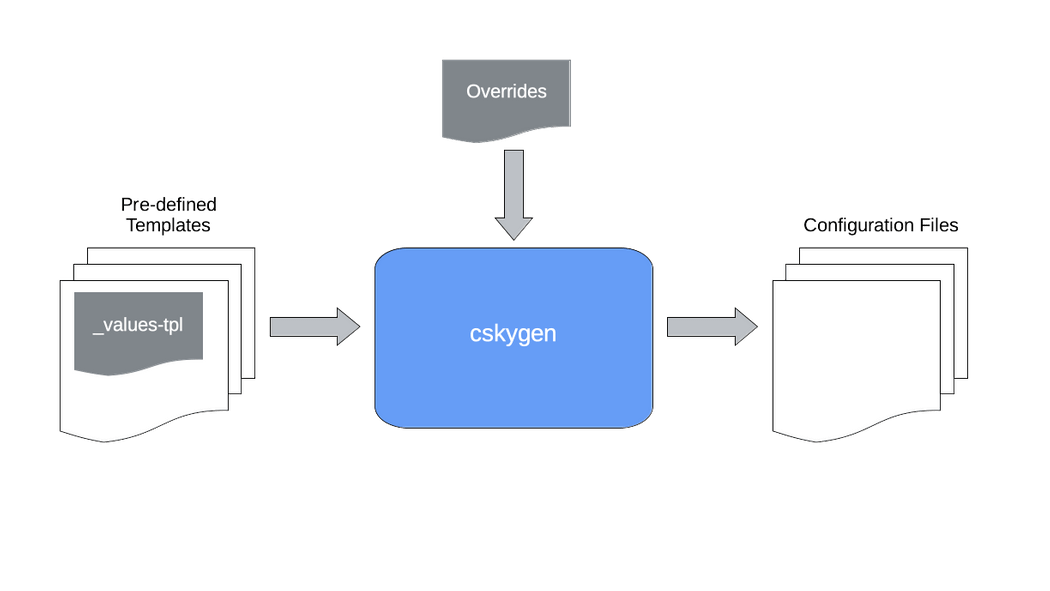Configuration genesis (cskygen)
cskygen
v1.0.2cskygen is a CLI application that generates configuration files from pre-configured templates.
It is widely used in cSkyLab project to create configuration files for machines, services and applications.
cskygen is developed using Go templates specifications.
It is compatible and integrates the use of Helm Charts in kubernetes services deployment.
Background
When creating customized configuration files from the template, cskygen uses a customization process based on 2 layers applied in the following order:
Template default values file:
_values-tpl.yaml. It contains default customizable values. It must exist with that name inside the template directory.Overriding file : User generated
.yamlfile. It contains overriding values that define the service according to the customizations you made.
Values from the overriding file take precedence over the template default values file.
cskygen uses Viper to read and merge .yaml configuration files.
NOTE: To avoid parsing images and Helm Charts, files below directories named
imagesorchartswill not be considered by cskygen.
Template Libraries
Template libraries contains configuration models used to generate customized configuration files for machines, applications and services with the cskygen utility.
cSkyLab project template library is located at directory tp-cskylab in your repository. You can create your own library either by forking cSkyLab templates or by creating it from scratch.
Template resource files must be developed according to Go templates specifications.
NOTE: All keys in overriding and template values files must be in lowercase. Files cannot have empty keys configured.
To learn more about cSkylab template library see documentation at cSkyLab Templates Library
How-to guides
Build & install cskygen
Building & installing cskygen is necessary to generate application and service configurations from template libraries.
Prerequisites:
- cSkyLab git repository cloned
- Go language 1.16 or later installed
Build binary file:
cskygen uses go modules go.mod and can be installed directly from the git repository.
To build and install cskygen binary file in $GOPATH/bin, open a terminal in the cskygen directory, and execute:
go install .
Using cskygen with configuration runbooks
cSkyLab Templates provide configuration runbook models with snipets and yaml override values, to make easier the creation of any application configuration directory from its template. These runbook models can be imported to a working directory _cfg-fabric to be customized with the appropriate values for each application or service you need to deploy.
To create configuration files from templates with runbooks:
- Go to
_cfg-fabricdirectory. (e.g.,/YourRepo/_cfg-fabric/) - Open terminal and follow instructions in
README.mdand*.mdrunbooks.
Using cskygen manually
To manually use cskygen to create application configuration files from templates you must follow two steps:
- Prepare the overriding file
- Execute cskygen
1.- Prepare the overriding file:
- Select the template you want to use
- Copy the template default values file:
_values-tpl.yamlto your$HOMEdirectory with your overriding file name (Ex.:app_xxx.yaml) - In your overriding file at your
$HOMEdirectory, change the desired values for your installation. - Save the file
2.- Execute cskygen:
Open a terminal in your
$HOMEdirectoryExecute the
cskygen createcommand with the following flags:flag -dDestination app configuration repository directory (Must not exist) -tTemplate directory -fOverriding file (.yaml extension required on filename but not in flag) Check the created configuration directory
If you need to repeat the process with different overriding values, simply delete the configuration directory, change the overriding values, and execute again the cskygen create command to generate the new configuration directory.
License
Copyright © 2021 cSkyLab.com ™
Licensed under the Apache License, Version 2.0 (the "License"); you may not use this file except in compliance with the License. You may obtain a copy of the License at
http://www.apache.org/licenses/LICENSE-2.0
Unless required by applicable law or agreed to in writing, software distributed under the License is distributed on an "AS IS" BASIS, WITHOUT WARRANTIES OR CONDITIONS OF ANY KIND, either express or implied. See the License for the specific language governing permissions and limitations under the License.
